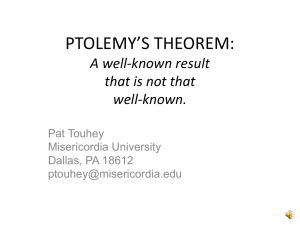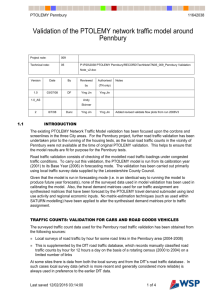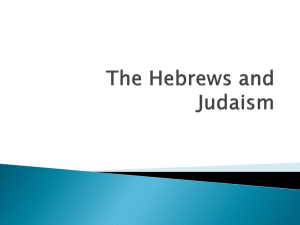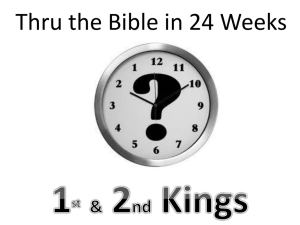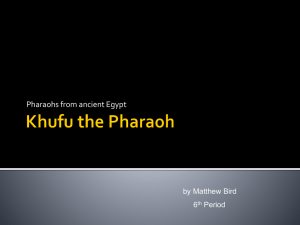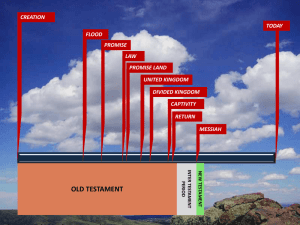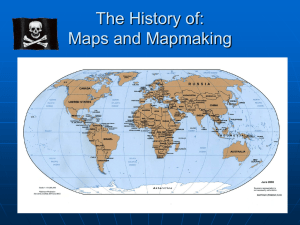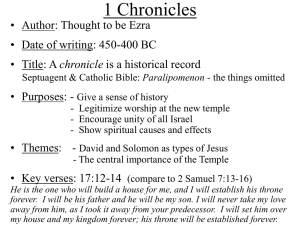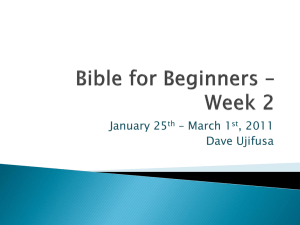Timeline of the Hebrew Scriptures - Old Testament
advertisement
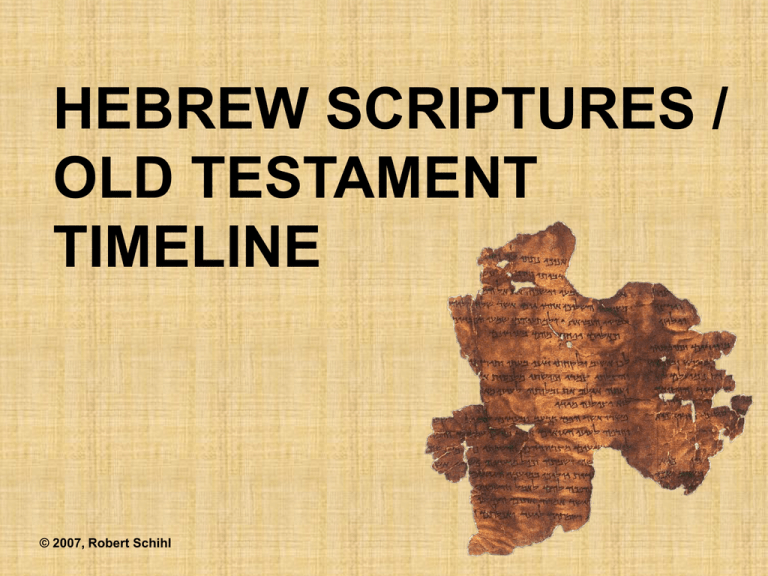
HEBREW SCRIPTURES / OLD TESTAMENT TIMELINE © 2007, Robert Schihl Choice of Dates and Events No set of scripture dates for the Hebrew Scriptures/Old Testament will satisfy all readers and scholars. Choices based on scholarly evidence must be weighed. The dates of this timeline are based on research as presented in the Jerome Biblical Commentary by Raymond Brown, Joseph Fitzmyer and Roland Murphy, The Bible Timeline by Thomas Robinson, and The Handbook of Biblical Chronology by Jack Finegan. Brown, Fitzmyer and Murphy also present their findings in The New Jerome Bible Handbook. The crucial date chosen from all this research in creating a baseline for the timeline is the time of the Exodus. The evidence that Rameses II was the pharaoh of the Exodus is cogent enough to warrant its use in building this timeline. Graphic Representation of Hebrew Scripture/Old Testament Books As with most research, some set of criteria must be chosen to present the dates of the Hebrew Scriptures/Old Testament books. This timeline uses periods of time during which the particular books were either collected, formulated and/or written. The oldest Christian canon of Old Testament books, the Septuagint canon, as affirmed by the North African Church Councils of Hippo (393 AD) and Carthage (397 AD) was also used. This list of 46 books remain intact until this day and possess the most authority. The 46 books were the canon of the Christian Old Testament for almost 1100 years until the 16th century. The shaded rectangles for each book do not propose to be chronologically accurate in terms of length of development and serve only to denote the period of time during which the book probably developed. Accuracy of length of development can never be determined. The heavily shaded portion of the rectangle approaches the date(s) research shows as most probable for the event. If there are more specific dates calculated for the period of the development of a book, they are given with the shaded area of the rectangles. Authorship and Abbreviations Used In creating the development of some Hebrew Scriptures/Old Testament books, especially those of most antiquity, e.g., the Pentateuch, the neat and clean designation of authorship cannot be expected. Hence, the first five books of the Bible are expressed in their developmental form, making use of the best scholarship available. In using the developmental aspect of the books, the identifiable sections following from both literary style and content of the books is used. The letter J is used for that author or editor who used the word “Yahweh” for the name of God; the letter E for the author or editor who used the word “Elohim” for the name of God; P for the author or editor who was from the priestly caste of Israel and emphasized the Temple and its liturgy; and D for that author or editor who emphasized the Deuteronomic tradition of the Jews. This developmental process in no way denies an original author of a book but concentrates on the process through which the book went before it arrived in the form in which it is found today. This developmental process expressed in this timeline does not question either the Divine inspiration nor the authenticity of the books but manifests the role of human authors responding to the Divine Author. Bob Schihl, Ph.D. January, 2007 Jacob Terah and Family migrate from Ur to Haran 1925 + Abraham 1835 Esau 1835 Isaac 1895 1995 BC 2000 Ur 1820 1975 1950 1925 1900 1875 1850 1825 18 Dinah Reuben Simeon Levi Judah Issachar Zebulun Dan Naphtali Gad Asher Benjamin 1734 Manasseh Ephraim 1727 Sold into Egypt Joseph + 1744 Jacob and Family migrate to Egypt Jacob 1705 + 1634 1688 Esau ? 1715 Famine 00 1775 1750 1725 1700 1675 1650 1625 Hyksos Period 13th - 17th Dynasties 16 Israel in Egypt Hebrews forcibly conscripted into hard labor gangs 1450 + The People of Israel Prosper in Egypt 00 1575 1550 13th Dynasty Begins Ahmose 1567 1525 1500 Thutmose II Thutmose I 1526 1512 1475 Thutmose III 1450 1425 Amenhotep II Thutmose IV 1411 1450 1425 14 EXODUS AND CONQUEST PERIOD OF THE JUDGES Othmiel 1381 1367 Mesopotamians Ehud and Shamgar 1327 Moabites 1309 Joshua 1321 Moses 1209 Canaanites Israelite males are circumcised; celebrate Passover first time; Jericho falls 1234 + + 1211 1228 Ten Commandments Divides Canaan at Sinai among Tribes + The Exodus 1275 1234 1229 1355 Aaron 1358 00 1375 1350 Tutankhamen Akhenaton Amenhotep III Aya 1362 1352 1379 + 1348 Introduced monotheistic worship Married his sister Nefertiti 1235 1235 1325 1300 19th Dynasty Seti I Horemheb Rameses I 1320 1304 1318 1275 Ramses II 1250 1225 Merneptah 1237 1223 12 Seti II 1210 1200 (1300-1050) (1200-1050) Deborah and Barak Gideon 1169 1162 Midianites Tola and Jair 1122-19 Abilemech Samuel 1086 Jepthah 1096 1078-75 Ammonites and Philistines Samson 1090 Becomes a Judge 1050 + 1006 Samson 1055 1055 David 1034 Saul is King of Israel 1025 ? 00 1175 1150 Ruth 1120 1115 1125 Saul 1054 ? 1100 1075 1050 + 1004 1025 1-2 Samuel Assembled Book of Judges 10 Northern Tribes Choose Jeroboam as King 926 Jeroboam + David Captures Jerusalem 999 + + 990 David Marries Bathsheba Nadab 906-5 Zimri Elah 883-1 Ahaziah Joram Baasha Ahab Tibni 839 882 876 871 851-50 Omri 882 870 00 Jehu 811 Northern Kingdom of Israel Southern Kingdom of Judah 965 Crowned King 926 Rehoboam + 966 Abijam 911-08 Asa Solomon 989 Israel Dominated by Syria 810 + Temple of Jerusalem is Built 961 954 975 950 960 926 ? 925 930 Writing of Yahwist (J) Sources 900 Obediah 848-841 ? ? Johoram Jehosaphat Athaliah 845-40 833 867 870 Ahaziah Elisha Elijah ? Joel 850 ? 835 875 850 825 850 Formation of Elohist (E) Sources Joash 799 ? 80 Tiglath-pileser III Kingdom of Israel Ceases to Exist King of Assyria 722-700 Invades Israel + 738 + Menahem Pekah Hosea Jeroboam II Zechariah Jehoahaz 722 739 730 751-49 797792 Joash + Shallum Pekahiah 795 Fall 781 738-36 of Shalmaneser V begins 3-Year Siege of Samaria 725 + Samaria Hosea Isaiah 715 755 740 734 Jonah Micah 753 782 700 735 Amos ? 760 753 ? Ahaz Hezekiah Amaziah ? 732 716 + 794 764 Uzziah (Azariah 701 735 787 Jotham Sennacherib 697 King of Assyria 794 733 Invades Judah ) 0 775 750 Amos 725 700 Hosea Isaiah 1-39 721 605 Nebuchadnezzar Attempts to Conquer Egypt 601 + Nebuchadnezzar ? 680 686 Nahum 664-654 ? Zephaniah ? 632-628 Manasseh 675 650 ? ? Habakkuk 609-05 ? ? Jeremiah 627 Jehoiahaz Amon Josiah 642-40 609 625 Jere 622 Making of the Deuteronomic Tradition Nahum Composition of Habakkuk 609 Meeting of Yahwist and Elohist Micah 60 Zephaniah Joshua 1-2 Kings Shaped PERSIAN PERIOD (538-332) BABYLONIAN PERIOD EARLY POSTEXILIC PERIOD (539-332) Daniel 535 + Kingdom of Judah Ceases to Exist Baruch 538 597 Edict of Cyrus 539 Ezekiel + 593 571 Cambyses Cyrus 522 550 530 587 Fall of Jerusalem; Temple Destroyed 586 + Jeremiah 580 Jehoiachim Jehoiakim 597 587 Zedekiah Babylonian 0 Darius I Artaxerxes I Zechariah 520 Begins to Prophesy Babylon Defeated Haggai + ? 520 Begins to Prophesy Captivity 550 Lamentations ? 480 Ezra ? ? Malachi ? 432-424 ? ? 444 Reads Temple Scroll + 520 Foundation of the new Temple laid + 516 Temple is completed 525 500 475 450 1-2 Chronicles 450 2 Isaiah 40-56 521 40 Ezra Esther Making of the Priestly (P) Source Proverbs 425 428 474 550 550 Joshua Revised 424 Nehemiah ? 445 Rebuild Jerusalem’s Walls Restoration period miah 1-2 Kings Final Version 3 Isaiah 56-66 Psalms Final Form 560 520 500 Deuteronomic History Jonah Zechariah 1-8 1-2 Samuel Final Darius II 465 539 575 Ezekiel Xerxes I 486 Nehemiah Job Malachi Merging of JE + P 486 Haggai JEP + D THE GREEK ERA PERSIAN PERIOD Aramaic Increasingly Replaces Hebrew 375 + 333 Samaritans Build Temple to God on Mount Gerizim Persian Rule of Egypt Ended 405 + 405 The Translation of the Septuagint Began 250 + Alexander Conquers Hellenistic Rulers / Egypt Ptolemy IV Philopetor Palestine Ptolemy III Euergetes Ptolemy I Soter Ptolemy II Philadelphus 332 221 305 282 246 204 + Alexander the Great + 323 356 Seleucid Rulers / Syria Antiochus II Theos Seleucus III 331 Seleucus II Callinicus Aniochus III Seleucus I Nicator Antiochus I Soter Conquers Egypt; 312 261 246 225-23 281 Founds Alexandria 0 375 Joel Obediah Merging 350 325 Zechariah 9-14 300 275 250 225 Psalter as Known Today Ecclesiates 20 THE ROMAN ERA THE HASMONEAN ERA Maccabean Revolt Mary and Joseph Betrothed 8 + Temple Temple Desecrated Rededicated 167 164 ++ Alexandra Salome Hyrcanus II Judas Maccabeus Simon Maccabeus Aristobulus 76 67 40 142 135 104-3 165 160 Antigonus John Hyrcanus Alexander Jannaeus Aristobulus II Mattathias Jonathan Maccabeus 40-37 168-66 160 142 135 104 67-63 76 Cleopatra II Ptolemy XI 101 Ptolemy VIII 80 Cleopatra I Ptolemy IX Ptolemy X Ptolemy VII Ptolemy V Epiphanes Ptolemy VI 116 107 88 204 180 176 Neos Philometor 80 Ptolemy XII 145 Antiochus IV Epiphanes Antiochus VI Seleucus IV Antiochus V Alexander Antiochus VII 187 175 164-2 150145-2 138 129 Demetrius II Trypho 0 200 175 150 125 100 JESUS CHRIST 6 BC Pompey Conquers Jerusalem for Rome 64 Herod the Great + 40 75 120 180 Book of Wisdom Judith Tobit 180 100 Sirach 1 Maccabees 165 Final Form for Book of Daniel 164 Baruch 80 2 Maccabees Temple and Mount Built 20-18 50 4 25 1 + 5 Paul is Born • Questions or comments? – Email • Dr. Robert Schihl (rjschihl@catholicapologetics.org) © 2007, Robert Schihl

